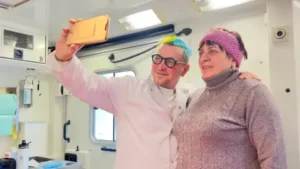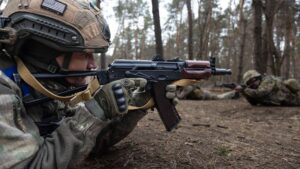In the heart of a war-torn Ukraine, Dr. Serhii Baksheiev serves on the front lines of women’s healthcare, showcasing resilience and commitment in a time of dire needs. Operating a mobile clinic, whimsically named “The Feminine Shuttle,” Dr. Baksheiev operates from a purple and white ambulance equipped with essential medical tools in areas severely affected by the ongoing conflict with Russia. This mobile unit stands out not only for its bright colors but also for the significant service it provides—a beacon of hope amid devastation.
Dr. Baksheiev, a 53-year-old obstetrician and gynecologist, has been tirelessly attending to women since the war began in 2022. He has conducted over 1,000 gynecological examinations in locations where traditional medical facilities have either been bombed or completely destroyed. Many of the women he assists endure their first medical consultations in three years, primarily due to the war disrupting access to healthcare services. The emotional weight of this reality is apparent as these women, many of whom venture into the clinic for the first time, line up quietly outside the van, seeking not just medical help but empathy and understanding from Dr. Baksheiev and his team.
The need for such services is illustrated through the statistics provided by the World Health Organization (WHO), which reported over 1,940 attacks on healthcare facilities across Ukraine since the invasion. This alarming figure underscores the challenges faced in meeting healthcare demands, particularly as the war has resulted in a dramatic increase in such attacks. Facing these odds, Dr. Baksheiev initially sheltered in a Kyiv bunker, where he helped deliver babies amidst the chaos of air raids. This experience heightened his understanding of the healthcare crisis, especially concerning women’s health issues, leading him to establish his mobile clinic.
The “Feminine Shuttle” is remarkably outfitted, featuring an ultrasound machine and equipment for performing minor surgeries. Initially, when Dr. Baksheiev and his team embarked on volunteer missions, they encountered dire shortages of medical supplies and makeshift examination environments. This experience prompted the development of the mobile clinic, which has become a vital asset in places where no doctors are available. As he travels through rural areas such as Kharkiv and Chernihiv, Dr. Baksheiev and his small team work discreetly and hastily, carrying out surgeries and examinations to evade the attention of occupying forces.
During each two-day mission, he can perform approximately 80 colposcopies—procedures used to inspect the cervix for potential malignancies. The high incidence of malignant tumors discovered among women in these areas raises urgent concerns regarding women’s healthcare in conflict zones. Reports from Ukraine’s public health ministry indicate a worrying decline in the early detection of ovarian and cervical cancers, directly tied to the crisis ignited by the war.
Dr. Ulana Supron, a former health minister of Ukraine, points out the looming health crises, dubbing it a “ticking time bomb” as the war continues. The long-lasting ramifications of stress, trauma, and the overall destruction of healthcare services create an environment ripe for deterioration in physical and mental health. She highlights the government’s efforts in partially rebuilding nearly 964 medical facilities, often in collaboration with international organizations like the WHO.
Despite battling his own health issues—Dr. Baksheiev received a cancer diagnosis himself in September 2024—his commitment to serving the community remains unwavering. In these moments, he provides not just medical treatment but also a listening ear, fulfilling a dual role as both physician and therapist, helping women navigate their experiences and emotions shaped by the ongoing war.
Dr. Baksheiev’s mobile clinic is not merely a healthcare unit; it serves as a lifeline for women in dire need of medical attention and emotional support. His persistent dedication continues to shine a light on women’s health amid the chaos, illustrating a profound commitment to both healthcare and humanity in the midst of grave circumstances. The ongoing conflict may disrupt lives, but efforts like those from Dr. Baksheiev underline the resilience of the human spirit, striving for better health and well-being against all odds.











